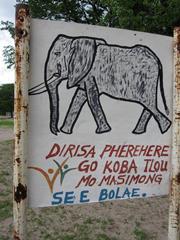PhD student, Department of Politics and International Studies, Smuts Research Grant recipient
The politics of land, conservation and the state in postcolonial Botswana
My research focuses on the politics of land, wildlife conservation and state-building in southern Africa, and is centred on in-depth fieldwork in remote conservation-adjacent areas in Botswana conducted in the second year of my PhD. Without the support of the Smuts Memorial Fund Graduate Research Grant much of this fieldwork, which underpins the novelty of this research, would have been impossible.
My PhD dissertation is concerned with the relationships between the state and its citizens and I use biodiversity conservation policies as a lens through which to examine this interaction. This approach considers biodiversity conservation not as simply a technical, scientific or apolitical practice but as one that is deeply connected to processes of the international political economy, postcolonial statehood, and citizen-state relations. I chose to examine these dynamics in the empirical case of Botswana for several reasons, the first being that Botswana has dedicated a huge portion of its land area—nearly 40 per cent of the country—to biodiversity conservation. Conservation has become an incredibly lucrative industry in Botswana, as wildlife tourism brings in millions of dollars every year. Additionally, in January 2014, Botswana enacted a sweeping conservation regulation banning all wildlife hunting for the first time in its history—a decision that has been highly controversial affecting both the tourism industry and local livelihoods, and serves as a focal point in my research, and will result in entirely novel findings.
Field research was crucial to getting to the core of the nature and implications of controversial conservation policies. My field research was conducted over the course of ten months in Botswana’s rural, conservation-adjacent areas, and the data collection consisted primarily of qualitative interviews. These interviews, approximately 280 in total, were open-ended and informant-led. I went into each interview with a broad rubric of topics related to my research question but allowed informants freedom to discuss issues as they understood them. Thus interviewees’ responses and opinions drove the direction and findings of my research, allowing for exploration of the way they actively construct and perceive their relationships to the Botswana state and their land, resources and environment.
While elite interviews were part of my research plan, the bulk of my study is concerned with the ways in which local people living in Botswana’s rural spaces perceive, experience and contest their positions as citizens of a conservation-conscious state. In order to engage with these informants it was of paramount importance to be able to conduct interviews and observations away from the capital city and the regional population centres. This is because those Batswana most impacted by the political impacts of conservation policy are living in and adjacent to the conservation estate. In order to conduct face-to-face interviews with people living in rural, conservation-adjacent communities in Botswana I needed to hire a research assistant for translating and rent a four wheel drive vehicle and camping equipment—all costly items in my research budget. Without research support funding from the Smuts Fund I would not have been able to conduct fieldwork as ambitious and wide-ranging as I did, nor would I have been able to engage with as many residents of Botswana’s conservation areas.

